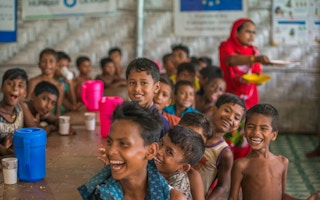Last week saw some important moves by international financial institutions to respond to the Covid-19 crisis. At their Spring Meetings, the World Bank and IMF rightly focused on ensuring the global financial system has sufficient liquidity and getting emergency health support and relief as quickly as possible to the countries who need it most, and the G20 agreed a debt moratorium for low income countries. These are surely welcome first steps in the poorest parts of the world. What next?
The IMF, the World Bank and their shareholders must now start to outline an economic recovery from an unprecedented global shutdown that delivers for both people and the planet on which we depend.
Beyond the immense and overt human tragedy, as the global death toll approaches 180,000, the IMF called the lockdown the ‘worst economic downturn since the Great Depression’, estimating the cumulative loss to global GDP could be around $9 trillion, greater than the combined economies of Japan and Germany. And the International Labour Organization expects the pandemic to cause a 6.7 per cent reduction in working hours, the equivalent of 195 million job losses in the second quarter of 2020.
“
The possibility of a global pandemic was not unforeseen but we were still blindsided. This health crisis is one result of a global economy that trades on environmental exploitation and degradation, and ignores the needs of millions of people living in poverty.
Beyond these numbers lie shifts in fortune and well being and security, especially for those already living in poverty. The world must come together as never before if it is to deal effectively with the wave of health crises across countries, the job impacts of the various forms of lockdown, and then a recovery that leaves us in a better place than before this tragedy. And most of all, Covid-19 shows us we must radically change our relationship with nature.
The possibility of a global pandemic was not unforeseen but we were still blindsided. This health crisis is one result of a global economy that trades on environmental exploitation and degradation, and ignores the needs of millions of people living in poverty. Nature loss, deforestation, land clearance and unsustainable agriculture make us more vulnerable to pandemics, and pollution makes the most vulnerable less resilient to the impacts on their health.
Economic recovery packages need to make us more resilient in the face of the next crisis. Investments in nature-based solutions should be front and center to protect and restore natural ecosystems while addressing challenges such as water and food security and supporting human health and well-being should be priority.
Governments and companies that have reserves or can afford to take on more debt to weather the Covid-19 economic storm are doing so, but investments made now must support resilience and build back better, or the next crisis will be a bad sequel to the current horror.
A spate of recent analyses from WWF, the OECD and others outline how this can be done, and as the World Resources Institute has pointed out, investment in low-carbon development is one of the most effective ways of stimulating economic recovery. The New Climate Economy report shows climate action consistent with the Paris Agreement could create 65 million new low-carbon jobs by 2030, equivalent to the combined workforces of the UK and Egypt.
Beyond supporting the clean energy transition, infrastructure investment plays a broader role in encouraging economic growth and prosperity. Millions of people around the world still lack access to adequate health care infrastructure and other basic services like electricity, water, and sanitation - an acute problem in the face of Covid-19 - in addition to inadequate healthcare infrastructure. Without investment in these fundamentals, we can’t fight pandemics or meet the Sustainable Development Goals (SDGs).
Natural infrastructure like forests, wetlands and coastal mangroves can provide lower-cost, more resilient and more sustainable solutions that can deliver a wider range of benefits than conventional infrastructure. The Paris Agreement depends on greenhouse gas reductions from sustainable forest and land management, and investing in more resilient infrastructure would save $4.2 trillion, with $4 in benefit for every $1 invested.
G20 Leaders have recognised the importance of better integrating environmental and social considerations into infrastructure development. Now, we need to radically increase such investments to harness the power of nature, weaving together ‘green’ and ‘gray’ systems to lower costs and increase resilience.
We must also invest in sustainable, resilient food systems. Integrating human, animal and environmental health in a ‘One Health Economics’ approach could create millions of new jobs and business opportunities, while reducing hunger, and mitigating the risk of pandemics.
Prioritising sustainability delivers significant economic benefits in addition to better human health outcomes. And, while environmental sustainability was not front and center in the first round of global emergency response, IMF Managing Director, Kristalina Georgieva, World Bank Group President, David Malpass, and the G20 all highlighted their collective commitment to an environmentally sustainable recovery.
When international meetings on climate and nature reconvene in 2021, we must secure a New Deal for Nature and People that incentivises public and private investment in nature, and facilitates delivery of the SDGs - prosperity for all on a healthy planet.
It is ironic and instructive that as we live in lockdown, we’ve turned to nature for peace, appreciating cleaner air and skyline views in cities around the world. We should now ask how we get back to work in a way that doesn’t leave us gasping for air and defiling the natural world. We must rebuild by working with rather than against nature for our own health as well as the health of the planet.
Margaret Kuhlow is the Finance Practice Lead of WWF.













